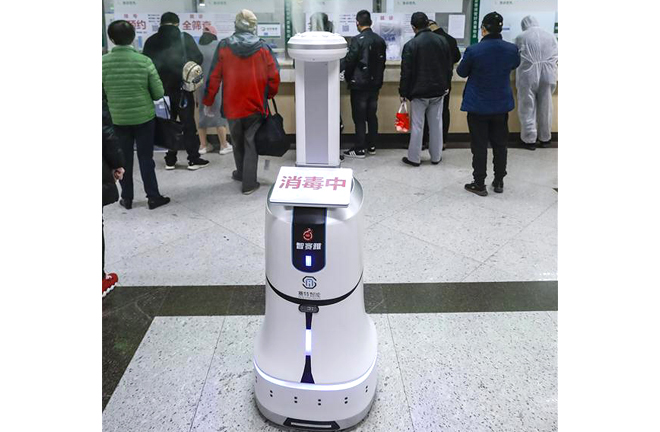Science, humanities join hands to tackle epidemic

An intelligent robot disinfects the outpatient hall at Renmin Hospital of Wuhan University in Wuhan, Hubei Province, March 16. The robot is able to work automatically at designated sites one by one. Photo: Shen Bohan/XINHUA
An article by President Xi Jinping on providing strong scientific and technological support for winning the battle against COVID-19 was published on March 16 in the Qiushi Journal, a flagship magazine of the Communist Party of China (CPC) Central Committee.
Stressing that science and technology are the most powerful weapons in humanity’s battle against diseases, Xi, who is also general secretary of the CPC Central Committee and chairman of the Central Military Commission, said in the article that mankind cannot defeat a major disaster or epidemic without scientific development and technological innovation.
Scholars observed that synergy between science and the humanities helps fight the epidemic.
Using modern scientific knowledge to promote social progress requires humanistic participation. Zhao Meijuan, director of the Teaching and Research Office of Medical Humanities under the PLA General Hospital, said that a scientific spirit and progress could never be truly acquired without a humanistic spirit. Likewise, we cannot realize humanistic care and truly protect people’s lives without scientific spirit and scientific rationality.
Gong Shouping, head of a medical assistance team to Hubei Province from the Second Affiliated Hospital of Xi’an Jiaotong University, said that humanistic spirit is the soul of medical science. Respect for life is an important reflection of human progress and the development of civilization. The medical humanities play an important role in guiding and supporting medical science. That is why tens of thousands of medical workers from all over China have taken the initiative to come to Hubei’s aid, fighting the epidemic on the front line.
Research on the coronavirus outbreak should be interdisciplinary and integrated, said Duan Weiwen, director of the Research Center of Science, Technology and Society at the Chinese Academy of Social Sciences. Duan suggested using a series of strategies for epidemic prevention and control, including biosafety strategies, information monitoring strategies, knowledge sharing strategies and ethical value strategies.
The development of science requires humanities, and development of humanities also needs science, said Xie Yangju, deputy director of the Institute of Chinese Thought and Culture at Northwest University. Reforming and improving the system of disease prevention and control, implementing the medical and health services guiding principles of prioritizing prevention to hinder minor illnesses from developing into serious diseases, and improving the public health service system—all these initiatives display the direct involvement of humanistic factors in scientific activities.
edited by WENG RONG, NIU XIAOQIAN
